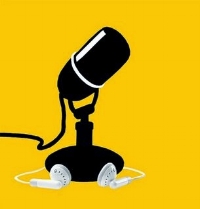Disability Podcasts ... Updated
/It’s been awhile since I posted about disability podcasting. That’s partially because there is still surprisingly little of it out there. What I mean by “little of it out there” is that there are few podcasts by disabled people posting episodes regularly. My own podcast’s checkered, inconsistent history is a good example. I also get the feeling that the same creative impulse that prompts people to do audio podcasts is being channeled more into making YouTube videos. Still, there are a couple of newish disability-themed podcasts I listen to that are worth your time.
Emily Ladau and Kyle Khachadurian are friends who have different disabilities, and subtly different ways of thinking about disability and disability issues. Actually, sometimes the difference isn’t subtle, though their disagreements never become unfriendly. Basically, this is the podcast to listen to if you want to explore the pros and cons of different schools of thought on disability. It sounds serious, and it is in intent, but the dialog itself is fun and surprisingly light. This is a great podcast for anyone in the disability community, but maybe especially for people just beginning to think about disability issues in a deeper way.
I have only just started digging into this podcast’s back catalog, but I’m pretty sure I’m going to learn at lot from it. In Sickness + Health explores what you might call the chronic illness sector of the broader disability community, focusing on how we actually think about and relate to our bodies when they don’t work as designed … or when they actively rebel against us. I tend to gravitate more towards the social, political, and practical aspects of disability culture, yet my own disabilities very much fit into the more medically involved chronic illness zone. So this podcast is probably perfect for me. At the same time, it also seems to do a good job of connecting the very personal physical and emotional aspects of disability with the social and political dimension. Basically, I am very intrigued. I’ll be listening more in the near future.
Note: I am also adding this as an update to a post I did back in August, 2014: Disability Podcasts.










